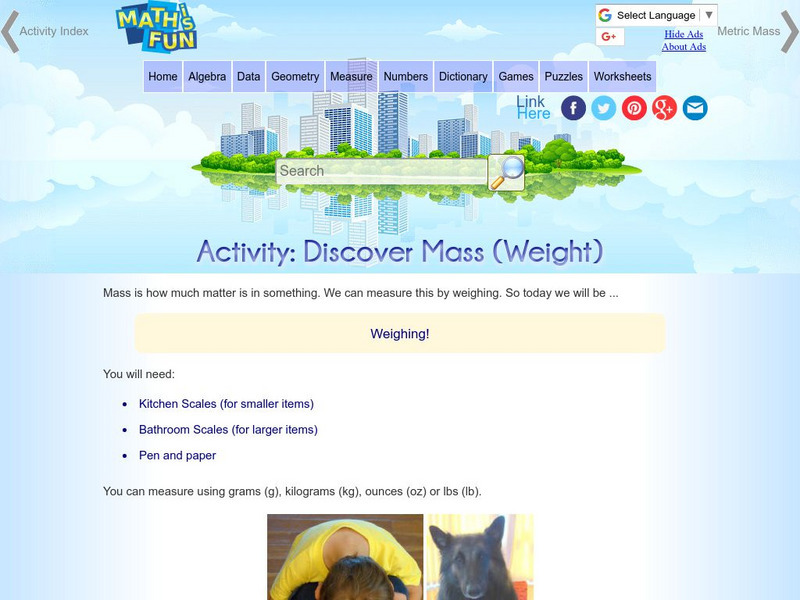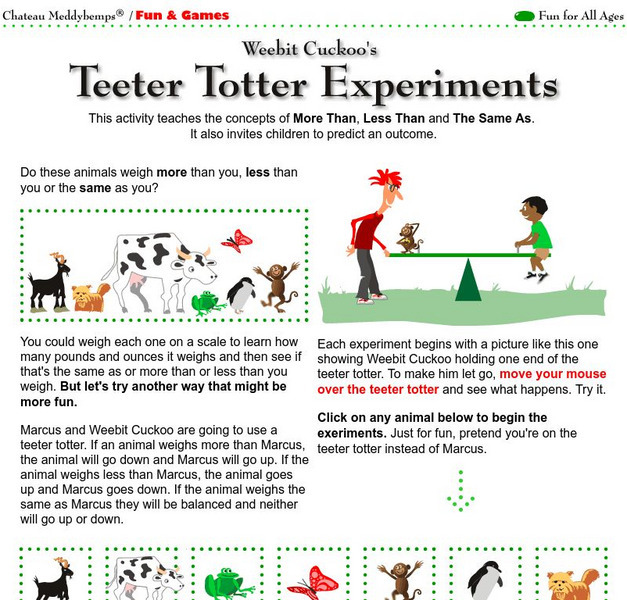Hi, what do you want to do?
Curated OER
Measuring Angles
Third graders describe an amount of turn from a particular position to another using the 'circular' benchmarks of 0, ++, ++, ++, and full turn. Estimation language such as 'just about', 'between', 'not quite', 'just over', and similar...
Curated OER
Houses
Third graders use a number of problem solving strategies in this unit of lessons. They determine how to draw and model three-dimensional objects, use co-ordinate systems, determine probability of events, and identify paths of simple...
Curated OER
Science-Unit on Matter-Gases
First graders understand that gases take up space even though you can't see or smell it. This is done through many experiments like trapping air in different sized bags, using balloons and plastic bottles, and blowing bubbles. They...
Teach Engineering
What Floats Your Boat?
Clay's as good a material as any to build a boat, right? An introductory lesson plan sets the stage for two activities associated with buoyancy. The first involves building boats out of clay, while the second uses these boats to measure...
Lane Community College
Review Sheets: Introductory Physical Science
This hybrid worksheet connects mathematics to a science class. Learners practice solving problems that involve making a variety of conversions. An assortment of questions hits all the calculations needed for a middle school or beginning...
Curated OER
Pendulum Problems
Ninth graders explore how pendulums function. For this pendulums lesson students complete a pendulum lab activity.
Curated OER
Does Size Matter?
Students explore chemical solutions. In this chemistry lesson, students investigate the relationship between three related experiments about solutions. Students determine variables that affect the chemical concentration of each solution.
Curated OER
Telling Time to 5 Minutes
Students take part in various activities ranging from creating a human clock, to small group problem solving to reinforce the concept of telling time accurately to five minutes on an analog clock.
Curated OER
Paper Planes
In this unit, 3rd graders investigate one variable to see if they can make a paper plane fly farther. They use scatter plots to establish a possible relationship between variables then use what they have found to make a paper plane to...
Curated OER
Main Sequence Stars: A System in Equilibrium?
Fourth graders study the equilibrium of internal forces in a main sequence star.
Curated OER
Star Power! Discovering the Power of Sunlight
High schoolers estimate the energy output of the sun. They estimate how much power sunlight the sunlight provides to the earth. They build a simple device to measure the amount of solar radiation the earth receives from the sun.
E-learning for Kids
E Learning for Kids: Math: Surfing: Mass: Comparing Mass
Catch the waves with Pete and find the mass of the items on the beach.
PBS
Pbs: Super Bear: Comparing Mass
Think about the relationships between weight and size of similar objects. This interactive exercise focuses on using critical thinking skills and estimation skills to predict how many mini and regular gummy bears it takes to have the...
Physics Classroom
The Physics Classroom: Circular & Satellite Motion: Your Weight on Other Planets
Take a quick trip to the other planets, and hop on the scale to find out how weight there compares to weight on Earth.
CK-12 Foundation
Ck 12: Elem Math: Selection Based on Weight (Metric Units)
[Free Registration/Login may be required to access all resource tools.] For this learning module, students practice identifying the heaviest or lightest metric weight from the choices given. Includes video demonstrating a sample problem...
Math Is Fun
Math Is Fun: Activity: Discover Mass (Weight)
The learning activity explores weight. Students weight different items and compare their mass from smallest to largest.
Oswego City School District
Regents Exam Prep Center: Metric Conversions and Rates
Find out all about measurement in this test prep lesson exploring English and metric measurement. Students can compare metric and customary measurements using the conversion charts, assess how much they have learned using the interactive...
Chateau Meddybemps
Chateau Meddybemps: Teeter Totter Experiments
Practice comparing mass by trying the Teeter Totter Experiment. Watch the teeter totter move up and down as you compare Marcus to each animal.
National Institutes of Health
Nih: Body Mass Index
Enter your height and weight and determine your body mass index. Compare your index to the BMI categories and learn if you are underweight, normal weight, overweight, or obese.
TeachEngineering
Teach Engineering: What Floats Your Boat?
Students use modeling clay, a material that is denser than water and thus ordinarily sinks in water, to discover the principle of buoyancy. They begin by designing and building boats out of clay that will float in water, and then refine...
Better Lesson
Better Lesson: Math Trash
A lesson where students collect trash, sort, and record the mass in grams. They will use their knowledge of numbers to figure out what category of trash had the most. The biggest idea of the lesson is that students will be more likely to...
PBS
Pbs Mathline: Sand Babies (Pdf) [Pdf]
In this engaging instructional activity, students use a variety of measurement strategies in creating their own Sand Babies. Students explore standard and non-standard measurements, area, data collection and analysis, and graphing....























